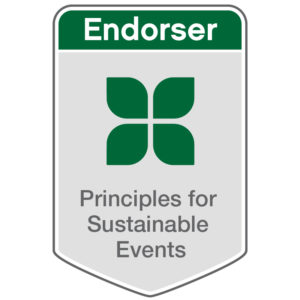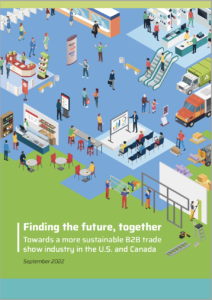The global exhibitions industry delivers enormous social and economic benefits. It’s an essential engine for connection, trade, learning, and employment creating millions of jobs and billions in economic activity worldwide.
Like all industries, we are working towards being a more sustainable, low-carbon industry – but we recognize we need to do more, faster, and we wanted to understand in more detail where the real areas for focus should be.
Leading businesses and stakeholders from across the industry have sponsored a three-year independent research project to gather authoritative baseline data on, and analysis of, the current environmental impact of the US and Canadian B2B trade show industry.
This report – produced by independent researchers Little Blue Research and A Bird’s Eye View and overseen by a task force made up of representatives from more than a dozen of the leading businesses and associations in the sector – summarizes the research’s insights. The report identifies six areas of greatest ‘Material Impact,’ quantifying each impact, highlighting the progress already made to reduce that impact and looking towards ways of further reducing the impact in the future.
- Carbon emissions from participant travel
- Carbon emissions from venues
- Carbon emissions from logistics
- Material waste from venues
- Waste from GSC warehouses
- Booth materials
The report highlights the many good sustainability practices already in use by many of the industry’s key players – associations, venues, organizers, and service providers, such as:
- Venues and organizers working together to encourage exhibitors to create highly reusable ‘pipe and drape’ booths and to construct custom booths from reusable and easily recycled materials, as well as to specify use of recyclable and reusable materials throughout venues for e.g. carpeting and signage.
- Organizers and venues agreeing energy management plans to optimize the use of lighting, heating, and cooling before during and after the event is taking place; venues installing solar power arrays to provide a source of renewable energy.
- Innovating to enable, complex booth structures to be made from reusable and 100% recyclable materials which are also lighter and so produce lower carbon emissions from their transportation.
- Recommending more sustainable travel options to event participants, and offering high-quality carbon offsets to attendees as part of the registration process.
The report also sets out a high-level roadmap for change covering 30 ‘quick wins’ and longer-term actions the industry can take to move towards a more sustainable future.
But the report – and the research it summarizes – is primarily designed to provide the data and analytical bases on which the industry can confidently establish priorities for action and develop sustainability policies.
The report’s sponsors look forward to every industry organization joining them to help set actionable plans toward common sustainability goals through initiatives such as Net Zero Carbon Events Initiative and the EIC’s Centre for Sustainability and Social Impact.
Resources
- Download the Task Force Social Media Toolkit here.
- Download the Social Media Graphics
- Download the Task Force Press Quotes
Did you know?
- Travel to events by participants produces the largest environmental impact by a significant margin.
- The events industry is already undertaking multiple initiatives with many stakeholder groups – visitors, exhibitors, venues, hotels, public transport providers, and host cities – working to reduce the environmental impact of travel.
- However, there has to be recognition that travel is a fundamental part of how the trade show industry generates the vast positive economic and social value it contributes to society.
- Events are the modern-day market square, providing a vital place where commercial communities come together to trade and purchase, build and renew relationships, to learn and to share information.
- Our shared experience of COVID reinforced our innate understanding that face-to-face contact is a fundamental component of human relationships.
- The task force has continued to recognize the power of the B2B trade show industry to convene people, create human connections and solve problems in an efficient way. There is growing evidence that B2B trade shows allow many goals to be accomplished during a single visit to a trade show. Further work is needed to quantify the long-held belief that trade shows can be consolidators of travel, allowing many meetings to be held in one place, but early studies by the global association for the exhibitions industry, UFI, have confirmed that the majority (>80%) of attendees to trade shows do report that they save travel time and money by attending.












